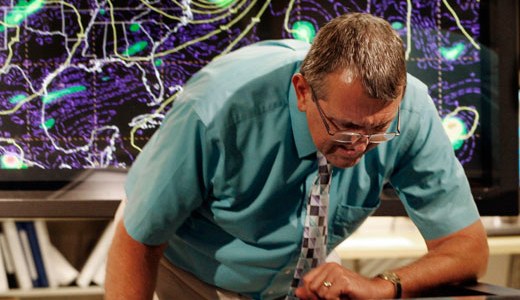
National Weather Service officials are warning New Jersey residents to prepare for Hurricane Irene now as a confluence of factors align to make the approaching storm a potential disaster for that state.
As of Thursday morning forecasts have Irene tracking within miles of the New Jersey coast as a full-force hurricane on Sunday, meaning possible catastrophic effects in many areas of the state. “Everyone should be preparing for this storm as now is the time. Have a plan in place,” wrote Dean Iovino and Michael Gorse, meteorologists at the National Weather Service, in their morning forecast discussion. “Everything remains on the table with this hurricane, which includes widespread damaging winds, torrential rain, coastal flooding, dangerous rip currents/waves and beach erosion.”
The National Hurricane Center said it appears a trough will form along the east coast, providing a pathway for the mega-storm to travel north rather than blow out to sea.
Many New Jersey towns have already had triple their usual August rainfall and, with river levels already far above average and soil already super-saturated, the high winds will more easily uproot trees. Several dams failed in New Jersey already, during a storm two weeks ago.
The state is expected to be hit with heavy rain and flash flooding during storms today and tonight, making things worse just before the hurricane. To add even more to the problem, Irene will arrive during a new moon, meaning that high tides will already be at much higher than normal levels.
Republican Gov. Chris Christie, notorious for his insistence that the federal government stay off of everyone’s back in New Jersey, is already demanding federal aid. He actually began demanding that aid last week, in the wake of seven days of heavy rainfall that inundated his state.
“The disaster is of such severity and magnitude,” Christie said, “that effective response is beyond the capability of the state and the affected local governments and federal assistance is necessary.”
The governor also asked Agriculture Secretary Tom Vilsack to designate agricultural emergencies in 17 New Jersey counties because of this summer’s heat and excessive rain and winds.
Christie is not the only opponent of federal aid who represents people in areas lying in the path of Irene.
Virginia, a state that is expected to be impacted before New Jersey, is home to House Majority Leader Eric Cantor, another leading opponent of “big government.”
Cantor, whose district is close to the epicenter of the 5.8 earthquake earlier this week, led the charge in the House against funding for the United States Geological Service, which studies, measures and predicts seismic activity and evaluates geological conditions after earthquakes.
A nuclear power plant just 20 miles from the quake’s epicenter is also in Cantor’s district.
The GOP majority leader also opposed funding for the National Weather Service and the National Oceanic and Atmospheric Administration, two agencies critical to the hurricane preparedness activity that now involves as many as 60 million Americans on the eastern seaboard.
Cantor-backed budget cuts will close 12 NOAA offices. which provide warning services for 230 million Americans. The National Weather Service budget would be cut by $126 million over the next six months with layoffs at 22 forecast offices and shorter work weeks for the storm prediction center and the national hurricane center.
Accurate tracking of hurricane paths is made possible, in part, by two polar satellites, one of which is nearing the end of its expected lifetime. Cantor’s House-passed bill denies the Obama administration its request for funds that would allow the satellite to be replaced.
Secretary of Commerce Gary Locke, whose department includes the NOAA, warned lawmakers, at hearings last March, of the consequences of losing one satellite. “We are now able to provide forecasting as far out to seven days, whether it is for hurricanes, major snowstorms, and so forth. That ability will be reduced to just three days, at best,” Locke said.
Photo: GOP budget cuts will close 22 National Weather Service forecast centers and force layoffs at the National Hurricane Center. (Jeffrey M. Boan/AP)












Comments